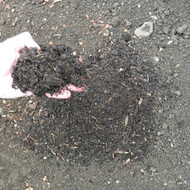Roses are strong growing plants which make a heavy demand on the food reserves of the soil. The nutrients need to be replenished regularly or the soil will become exhausted resulting in weak growing plants that are not healthy. A regular programme of manuring is essential [once every 12 months is fine] which means mulching the rose beds to a depth of about 3 or 4 inches [7.5cms or 10cms ] with well rotted manure. This blanket of manure keeps the feeding roots [ which are situated just under the surface of the soil] cool and moist and prevents them being baked in the summer sun and it also helps increase the humus content of the soil. Humus is organic matter which has reached a point of stability, where it cannot break down any further and could, if conditions do not change, remain in the soil for decades. It helps the soil retain moisture, and encourages the formation of good soil structure, and it is sometimes called the life-force of the soil. My favourite mulch is horse manure but there are other types equally as good. Cow manure is a cool wet manure which is of value on light sandy soils which tend to bake in the summer months. Pig manure is also a wet type of manure which is slightly richer than cow manure. Sheep manure is the richest of all manures except for pigeon and poultry droppings [both of which should be avoided due to their high nitrogen content].
Whilst on the subject of different types of animal manures, here is a little story that I like to tell of a rather unusual manure that I once encountered. Years ago Chester Zoo was renown for their wonderful roses and the reason for this was the constant use of Elephant manure. Whilst attending a lecture there I was introduced to the head gardener who promptly presented me with two rather big bags of this type of manure which I placed in the back of my estate car and set off on my journey home. The weather was very hot and sticky that day and even with all the windows fully open it could not dispel the rather pungent smell. On arriving home [in extremely quick time ] both car and passengers were completely tainted and it did not help one little bit when a neighbour on passing asked if I was trying out a new aftershave. But there was a plus side, it completely cleared my sinuses.
If the soil is heavy then its texture and crumb structure must be improved so that in time it will become more friable. It cannot be achieved in one season, it must be gradual over a few years of cultivation. Horse manure is of great value on heavy clay soils because it improves the porosity and helps maintain a higher soil temperature in the winter. If the soil on the other hand is light with a subsoil that is sandy then the drainage will be too severe and here we need to build up the humus content of the soil to make it retain more moisture and improve the fertility. As stated earlier for light soils use cow or even pig manure. Spent hops is also good for supplying humus as is leaf mould and peat . Do remember that whatever kind of manure you use it must be well rotted because if it is fresh and if it is touches the rosebushes it could result in the stems of the bushes being scorched by being burnt by the strong toxicity of fresh manures. Roses respond best in a loam that is deep and of a good quality which never gets waterlogged but has a good supply of nutrients in it to help sustain the long roots which they produce in order to get a good foothold and a cool root run.
Most of the successful rose growers have to grow their bushes under entirely different conditions than these and have triumphed by making the best out of what they have got. Their success should be an encouragement to anyone who feels he has no chance of growing good roses because his garden does not possess just the sort of soil which he believes is essential .The truth is by the use of proper cultivation and plenty of applications of manures and other humus forming materials, almost any garden can be made to grow very good roses.

